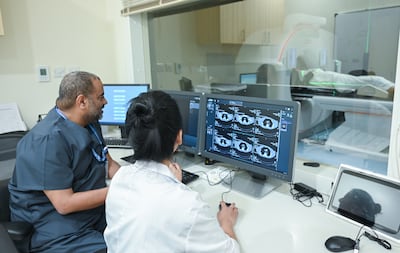A leading Abu Dhabi hospital has launched a dedicated radiation therapy department as part of an ambitious mission to become a major hub for cancer care.
Sheikh Shakhbout Medical City's cutting-edge facility – opened recently in partnership with Mayo Clinic – will embrace medical innovation and advanced technology as part of its drive to combat the deadly disease.
The health centre will treat up to 30 patients a day, helping to widen access to crucial services for people across the capital.
“SSMC is proud to be on a journey of continued growth to place patients’ needs first,” said Dr Daniel Chamberlain, chair of radiation oncology at the hospital, which is operated by Abu Dhabi Health Services Company, also known as Seha.
“Developed in partnership with Mayo Clinic, the radiation therapy department will support SSMC in expanding its oncological offerings.
“The department will provide external beam radiation therapy in a definitive and palliative care setting while utilising the latest technologies with the highest levels of precision and innovation.”
The radiation therapy department is the first to be opened in Abu Dhabi city by Seha, with an existing service in Al Ain.
“This will significantly ease the burden on patients, eliminating the need for tiresome commutes over the course of weeks,” said Dr Chamberlain. 'It is generally more convenient and comprehensive care.”
He said patients often require multiple radiation treatments over the course of a few weeks, so commuting can be a challenge.
“The department will be led by a renowned multidisciplinary team of experts consisting of radiation oncologists, medical physicists, radiation technologists and oncology nurses to provide highly specialised, holistic and patient-centred care of the highest quality.”

Delivering world-class care
Dr Naser Ammash, chief executive of SSMC, said expanding the hospital's cancer treatment services is key to its goal of providing world-class care to patients.
“Our newly opened radiation therapy department is set to provide added convenience and bring expert cancer care closer to home for patients living in the UAE and the region,” Dr Ammash said.
“Our focus remains on delivering integrated and innovative care led with empathy and compassion to achieve the best outcomes.”
Globally, there are more than 18 million people diagnosed with cancer and the disease is associated with 9.6 million deaths per year, SSMC said.
The hospital said the disease is the third leading cause of death in the UAE, with breast cancer being the most commonly diagnosed in the country.
What is radiation therapy?
Radiation therapy remains one of the most common forms of cancer treatments globally.
It involves using beams of intense energy to kill cancer cells, typically involving X-rays.
Radiation methods have become more precise over the years. Beams are aimed directly at the cancerous area, while safeguarding healthy tissue from high doses of radiation.
Radiation therapy can also be used in conjunction with other treatments, such as chemotherapy.
Radiation therapy has known side effects such as hair loss and nausea, but for many patients its still offers the best chance to beat a disease which kills millions of people across the world each year.
More than half of all cancer patients will receive radiation therapy at some stage of their treatment, the Mayo Clinic states.

